by Amber Kevlin, RN | Sep 19, 2023 | Senior Home Care
 Senior memory loss is inevitable for the aging adult, but the degree can vary immensely. Everyone experiences lapses in memory sometimes, but there are things that seniors can do to improve their memory, and prevent further issues down the road.
Senior memory loss is inevitable for the aging adult, but the degree can vary immensely. Everyone experiences lapses in memory sometimes, but there are things that seniors can do to improve their memory, and prevent further issues down the road.
Being proactive to prevent memory loss doesn’t have to be difficult. Small changes in daily habits won’t take up to too much time and energy, and the payoff is invaluable. Working to improve your cognitive abilities can make a world of difference in quality of life, for you and your loved ones as well.
The key to mental stimulation is change and challenge. Your brain already knows how to do the things you’re already good at. Try something new! Taking up a new hobby requires lots of brainpower, and as a bonus can help with keeping physical as well.
Some new experiences elderly seniors can enjoy may include:
- Genealogy research
- Learning a new language
- Learning social media/ using the internet
- Volunteering at the local shelter
- Reading to children at the local library
- Learning new gardening techniques

There are certain foods packed with vitamins that help prevent senior memory loss. Some foods include:
- Fatty fish, like salmon, anchovies, and whitefish
- Blueberries
- Broccoli
- Coffee
- Nuts
- Dark chocolate (yay!)
- We discuss some ways to improve eating habits here.
While there are supplements that also may help with memory loss, make sure to check with your primary care physician before taking anything over the counter, as they may interfere with prescription medication.
Some more organic ways to prevent senior memory loss and take care of your brain include routine daily exercise (no matter how small), a healthy diet, and even some fun brain puzzles. Try your hand at the weekly crossword puzzle or Sudoku , or even a good old-fashioned jigsaw puzzle, available at most local dollar stores.
Taking care of your brain is just as important as taking care of your body, and just like your body, it’s a “use it or lose it” type of situation. Taking small steps to improve your brain health can mean a much easier, healthier life down the road. Here are some more signs and tips from the National Institute On Aging to help you and your loved ones. It’s important to be able to detect Alzheimer’s and Depression when memory loss is a challenge.
My Choice Home Care is a senior home care service that serves clients in Macon, Jackson, and Haywood Counties in North Carolina. Counties served in Georgia are Rabun, Towns, and Habersham. Counties served in Upstate South Carolina are Oconee, Pickens, and Anderson. Email us or call (828) 200-9000 to speak to someone today if you or a loved one would like to enjoy the benefits of living independently in your own home. We offer a free Senior Care Options guide to help you navigate Medicare, Medicaid and other programs for seniors.
by Amber Kevlin, RN | Jul 10, 2023 | Senior Home Care
Developing a urinary tract infection (UTI’s) becomes an increasingly dangerous issue as we age, especially if left untreated.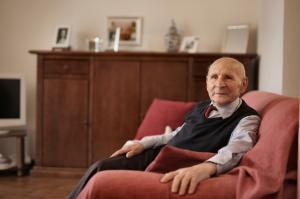 In the elderly population, detecting UTIs can be tricky, as some of the symptoms mimic natural decline in aging, or may be symptoms of a comorbidity such as with Alzheimer’s. Learning how to spot the symptoms and how to prevent infections can greatly increase the quality of life for seniors, and can possibly save a life.
In the elderly population, detecting UTIs can be tricky, as some of the symptoms mimic natural decline in aging, or may be symptoms of a comorbidity such as with Alzheimer’s. Learning how to spot the symptoms and how to prevent infections can greatly increase the quality of life for seniors, and can possibly save a life.
UTI’s begin when bacteria enters your urinary tract.
There are many different ways to allow bacteria into the body, and there are many factors that can contribute to contracting a UTI. The following issues have been identified as the most common factors that make the elderly population more vulnerable than most:
- Being unable to fully empty your bladder during urination means that the urine left behind can become stagnant, creating a breeding ground for bacteria. Men with enlarged prostates can also find it difficult to empty their bladders. Certain medical conditions can make it easier to develop a UTI such as Alzheimer’s and Parkinson’s. These conditions can cause what’s known as “neurogenic bladder”. A disruption of communication between the brain and the bladder causing urinary retention.
- Incontinence can cause UTI’s to develop. Prolonged use of pads and briefs can also breed bad bacteria if they
 aren’t changed often.
aren’t changed often.
Symptoms of a UTI can include:
- Feeling the need to urinate more frequently
- A feeling of urgency when needing to urinate
- A burning sensation when you need to go
- A general feeling of unease and pelvic discomfort
In seniors, diagnosing a UTI can be difficult as some symptoms manifest differently in the aging population. Seniors can experience an acute change in behavior, such as confusion, hallucinations, increased falls and agitation. Detecting these behavioral changes can mean all the difference in early detection. Left untreated, a UTI can cause kidney damage, and if the infection enters the bloodstream, it can be fatal.
If a UTI is suspected in an aging loved one, please visit a primary care physician or an emergency room if necessary.
If antibiotics are prescribed, the entire course will need to be finished for optimum recovery and prevention of reinfection. It can take some time, up to a week, to start feeling better.
Looking for help to keep your loved one at home? My Choice Home Care is a senior care service that serves clients in Macon, Jackson, and Haywood Counties in North Carolina. Counties served in Georgia are Rabun, Towns, and Habersham. Counties served in Upstate South Carolina are Oconee, Pickens, and Anderson. Call (828) 200-9000 to speak to someone today or contact us if you or a loved one would like to enjoy the benefits of living independently.
by Amber Kevlin, RN | Jul 10, 2023 | Senior Home Care
Caring for aging family members is no doubt a labor of love, and though emotionally rewarding, it can also be difficult to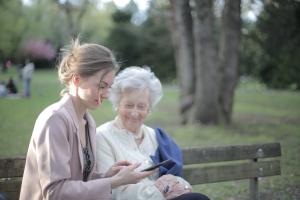 balance the needs of your loved one as well as your own. Respite care is defined as “short-term relief for caregivers,” according to the National Institute of Health, or NHI. The NHI also reports that a staggering 17.7 million Americans are caregivers to persons in their homes ages 65 and older. Helping senior family members “age in place” is becoming more common in the U.S. Finding ways to refill an empty cup can mean all the difference between caregiver burnout and a fulfilling, balanced life.
balance the needs of your loved one as well as your own. Respite care is defined as “short-term relief for caregivers,” according to the National Institute of Health, or NHI. The NHI also reports that a staggering 17.7 million Americans are caregivers to persons in their homes ages 65 and older. Helping senior family members “age in place” is becoming more common in the U.S. Finding ways to refill an empty cup can mean all the difference between caregiver burnout and a fulfilling, balanced life.
There are certain types of respite care available in most communities.
Respite care can be based on a schedule, such as a few hours a week, or on an emergency basis as well. These types of respite care include:
- Community respite, where a senior can participate in senior-based activities or programs, such as with an adult day-care or community organization.
- Facility respite care is where a senior can stay for extended periods of time. This may be the best choice for families that require overnight stays on a short-term basis.
- In-home care is when an agency or individual is hired to stay with your loved one at their home. This often giving seniors a feeling of independence while enjoying the comforts of their own home. This can be for a few hours a week or up to 24-hour care.
Some respite services cost more than others.
According to Genworth Financial, the breakdown of caregiver cost per day is as follows:
- Adult Day Care $78
- Home Health Aid $169
- Nursing Home Semi-Private Room $260
- Nursing Home Private Room $297
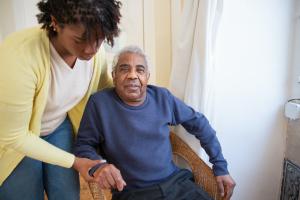
Take time to figure out what type of respite care works for your family, and within your budget. Having someone share the responsibilities can help ease the emotional and physical strain of family caregiving. This also gives your loved one a new socialization opportunity.
Are you or someone you know in need of respite care? My Choice Home Care is a senior care service that serves clients in Macon, Jackson, and Haywood Counties in North Carolina. Counties served in Georgia are Rabun, Towns, and Habersham. Counties served in Upstate South Carolina are Oconee, Pickens, and Anderson. Call (828) 200-9000 to speak to someone today or contact us if you or a loved one would like to enjoy the benefits of living independently in your own home.
by Amber Kevlin, RN | Jul 10, 2023 | Senior Home Care
Anyone who has worked in healthcare is familiar with the term “sundowning,” but family members of an aging loved one may not have heard of it. Sundowning is a term used to describe a peculiarity that occurs when a senior begins to experience symptoms of confusion and agitation later in the day or as the daylight begins to fade. Sundown Syndrome is not a diagnosis, but a description of symptoms or behaviors that generally appear in seniors living with Dementia and/or Alzheimer’s.
Sundowning symptoms may present as:
- Crying
- Moaning, yelling, or screaming
- Delusions or hallucinations
- Becoming agitated and combative
- Paranoia
- Anxiety
These are just a few, as there is no medical definition of sundowning with certain criteria. Other unpredictable behaviors can be covered by the term as well.
As there is no actual known cause for sundowning, there is no cure, but many experts believe that sundowning occurs after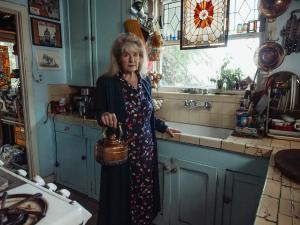 an Alzheimer’s or Dementia patient has experienced sensory overload, or has exhausted themselves during the day. Also be aware of what symptoms are “regular” or common for your loved one. An acute onset of delirium or hallucinations could be effects from a potentially life-threatening illness or infection.
an Alzheimer’s or Dementia patient has experienced sensory overload, or has exhausted themselves during the day. Also be aware of what symptoms are “regular” or common for your loved one. An acute onset of delirium or hallucinations could be effects from a potentially life-threatening illness or infection.
Some ways to alleviate or prevent potential symptoms of sundowning may include:
- Resting between periods of activity
- Keeping a regular, well-balanced diet with snacks during the day
- Allowing for time outside in the sun during the day, or keeping the rooms well-lit
- Drawing curtains in the evening
- Creating a calming atmosphere in the evenings with minimal noise and distractions
- Keeping the family aware of symptoms, and a log of tactics that do or do not work to calm down an agitated person.
Of course, in-home caregivers need to make sure they are taken care of as well. Family caregivers can find online support groups through the Alzheimer’s Association at https://www.alz.org or call their 24/7 helpline at 800.272.3900. Families may also look into local home care services for respite care, or to help your loved one stay independent in their home.
My Choice Home Care is a senior care service that serves clients in Macon, Jackson, and Haywood Counties in North Carolina. Counties served in Georgia are Rabun, Towns, and Habersham. Counties served in Upstate South Carolina are Oconee, Pickens, and Anderson. Call (828) 200-9000 to speak to someone today or contact us if you or a loved one would like to enjoy the benefits of living independently in your own home.
by Amber Kevlin, RN | Jul 5, 2023 | Senior Home Care
While scammers have been around for many years, they have become increasingly aware of the ease in which seniors can be defrauded by elderly scams. According to the most recent report from the Federal Bureau of Investigation’s elderly scams statistics, losses incurred by seniors jumped from $343 million to $1.685 billion from 2017 to 2021, equaling an increase of 391.9%. Here are some of the most common scams targeted at seniors, and how to avoid them.
What are Common Elder Abuse Scams?
Medicare Scams
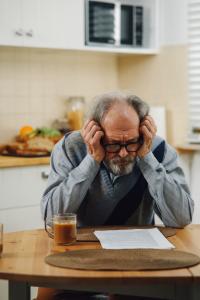 Scammers call seniors and say that they need to pay a fee to receive their new benefit card. They may also say that the enrollee is entitled to a refund, and they must give their Medicare information and banking numbers to receive it. To protect from elder scams, know that Medicare representatives will never ask for payment information on the phone or come to your house. If you have questions, you can call the number on the back of your Medicare card.
Scammers call seniors and say that they need to pay a fee to receive their new benefit card. They may also say that the enrollee is entitled to a refund, and they must give their Medicare information and banking numbers to receive it. To protect from elder scams, know that Medicare representatives will never ask for payment information on the phone or come to your house. If you have questions, you can call the number on the back of your Medicare card.
Family Emergency Scams
Scammers may call and say “Hi Grandma, guess who this is?” Excited or confused seniors may give a name, and when the scammer has an identity to follow through with, they will say they’ve been in an accident or have been arrested and need money. Unwitting seniors may then wire the money directly to the scammer. They will often try multiple times. To avoid this dilemma, ask personal questions about the family that a scammer would not know.
Sweepstakes Scams
This scam has been ongoing for many years, because it still works. The Council on Aging reported that at one point, scammers were stealing around $300 million dollars annually, just by carrying out elderly scam calls telling seniors they had won the Jamaican lottery. Seniors would load money onto a prepaid card or wire transfer, to pay “processing fees,” or “taxes.” Just remember, it’s impossible to win a sweepstake or lottery that you never entered.
Help for Preventing Senior Scams and Fraud
These 3 common elderly scams are among thousands that swindle seniors every day, an example of elder abuse that needs to be stopped. To add your phone number to the National Do Not Call List, please visit https://www.donotcall.gov/. If you feel that you or someone you know has been a victim of these scams, please call The National Elder Fraud Hotline at 833-372-8311.
My Choice Home Care is a senior home care service that serves clients in Macon, Jackson, and Haywood Counties in North Carolina. Counties served in Georgia are Rabun, Towns, and Habersham. Counties served in Upstate South Carolina are Oconee, Pickens, and Anderson. Call (828) 200-9000 to speak to someone today or contact us if you or a loved one would like to enjoy the benefits of living independently in your own home.
by Amber Kevlin, RN | Jun 15, 2023 | Senior Home Care
Starting in 2006, June became the Elder Abuse Awareness month, with Elder Abuse Awareness Day being June 15th, created by the International Network for the Prevention of Elder Abuse and the World Health Organization at the United Nations. Elder abuse is a growing problem in the United States, and covers many different definitions of abuse. Elder abuse may come in the form of neglect, emotional, physical, or sexual abuse, or even financial exploitation.
One reason why elder abuse may not be such a provocative topic such as animal or child abuse, is because animals and children do not carry the burden of expectations when it comes to self-care. Aging adults have spent their entire lives not only caring for themselves, but others as well. The line between independence and needing assistance is not usually an immediate awareness, but a point in the distance that creeps up slowly, and a lot of seniors may have passed that line and not known it. Or if they know it, they do not want to acknowledge it. This is where abuse usually begins.
As there are many types of elderly abuse, there will be many signs and symptoms. However, these symptoms of changes in behavior suggest that your loved one may be experiencing one or more types of elder abuse:
- Depression, confusion, or withdrawal from family members
- Unexplained bruises, wounds, or scars
- Bed sores from possible neglect or self-neglect
- A change in spending habits
- A neglect in hygiene (unwashed hair, clothes, etc..)
- Hazardous or unclean living conditions
- Unpaid bills lying around the home
These are just a few of many signs and symptoms of elder abuse. If you or a loved one are caring for an aging adult, please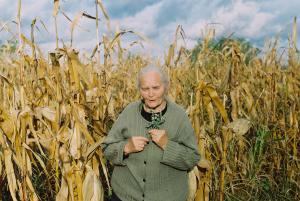 make yourselves aware of the seniors’ usual daily activities and living situation, so that anything unusual would become apparent. If your aging loved one lives far away, recruit friends and family to check in on them if possible. If not, research local in-home caregiving services to help your loved one live independently in their own home. If you suspect elder abuse, call 911, or you can call the Eldercare Locator at 1-800-677-1116. Specially trained operators will refer you to a local agency that can help. The Eldercare Locator is open Monday through Friday, 9 a.m. to 8 p.m. Eastern Time.
make yourselves aware of the seniors’ usual daily activities and living situation, so that anything unusual would become apparent. If your aging loved one lives far away, recruit friends and family to check in on them if possible. If not, research local in-home caregiving services to help your loved one live independently in their own home. If you suspect elder abuse, call 911, or you can call the Eldercare Locator at 1-800-677-1116. Specially trained operators will refer you to a local agency that can help. The Eldercare Locator is open Monday through Friday, 9 a.m. to 8 p.m. Eastern Time.
My Choice Home Care is a senior care service that serves clients in Macon, Jackson, and Haywood Counties in North Carolina. Counties served in Georgia are Rabun, Towns, and Habersham. Counties served in Upstate South Carolina are Oconee, Pickens, and Anderson. Call (828) 200-9000 to speak to someone today or contact us if you or a loved one would like to enjoy the benefits of living independently in your own home.
 Senior memory loss is inevitable for the aging adult, but the degree can vary immensely. Everyone experiences lapses in memory sometimes, but there are things that seniors can do to improve their memory, and prevent further issues down the road.
Senior memory loss is inevitable for the aging adult, but the degree can vary immensely. Everyone experiences lapses in memory sometimes, but there are things that seniors can do to improve their memory, and prevent further issues down the road.

 In the elderly population, detecting UTIs can be tricky, as some of the symptoms mimic
In the elderly population, detecting UTIs can be tricky, as some of the symptoms mimic  aren’t changed often.
aren’t changed often.
 balance the needs of your loved one as well as your own. Respite care is defined as “short-term relief for caregivers,” according to the National Institute of Health, or NHI. The NHI also reports that a staggering 17.7 million Americans are caregivers to persons in their homes ages 65 and older. Helping senior family members “age in place” is becoming more common in the U.S. Finding ways to refill an empty cup can mean all the difference between
balance the needs of your loved one as well as your own. Respite care is defined as “short-term relief for caregivers,” according to the National Institute of Health, or NHI. The NHI also reports that a staggering 17.7 million Americans are caregivers to persons in their homes ages 65 and older. Helping senior family members “age in place” is becoming more common in the U.S. Finding ways to refill an empty cup can mean all the difference between 

 an Alzheimer’s or Dementia patient has experienced sensory overload, or has exhausted themselves during the day. Also be aware of what symptoms are “regular” or common for your loved one. An acute onset of delirium or hallucinations could be effects from a potentially life-threatening illness or infection.
an Alzheimer’s or Dementia patient has experienced sensory overload, or has exhausted themselves during the day. Also be aware of what symptoms are “regular” or common for your loved one. An acute onset of delirium or hallucinations could be effects from a potentially life-threatening illness or infection. Scammers call seniors and say that they need to pay a fee to receive their new benefit card. They may also say that the enrollee is entitled to a refund, and they must give their
Scammers call seniors and say that they need to pay a fee to receive their new benefit card. They may also say that the enrollee is entitled to a refund, and they must give their  make yourselves aware of the seniors’ usual daily activities and living situation, so that anything unusual would become apparent. If your aging loved one lives far away, recruit friends and family to check in on them if possible. If not, research local
make yourselves aware of the seniors’ usual daily activities and living situation, so that anything unusual would become apparent. If your aging loved one lives far away, recruit friends and family to check in on them if possible. If not, research local
Recent Comments